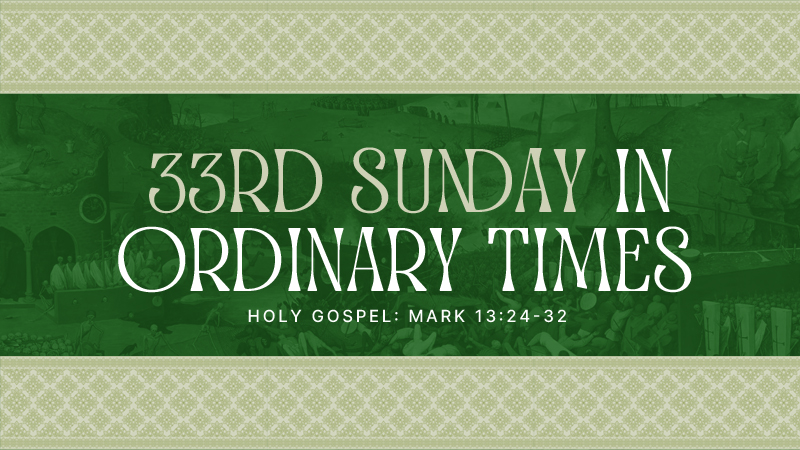Sunday Reflections | 33rd Sunday in Ordinary Times
By SIDTP SoCom
Published on November 17, 2024
“But in those days, after that tribulation, the sun will be darkened, and the moon will not give its light,
and the stars will be falling from the sky, and the powers in the heavens will be shaken.
And then they will see the Son of Man coming in the clouds with great power and glory.
And then He will send out the angels and gather His elect from the four winds, from the end of the earth to the end of the sky.Learn a lesson from the fig tree. When its branch becomes tender and sprouts leaves, you know that summer is near.
In the same way, when you see these things happening, know that He is near, at the gates.
Amen, I say to you, this generation will not pass away until all these things have taken place.
Heaven and earth will pass away, but My words will not pass away.
But of that day or hour no one knows, neither the angels in heaven, nor the Son, but only the Father.”
In today’s Gospel, Jesus speaks to His disciples about the end times—an event that is filled with cosmic upheaval and the revelation of the Son of Man in glory. He describes signs of great distress, where the sun will be darkened, the moon will lose its light, and the stars will fall from the sky. This vivid imagery can be unsettling, but it also carries a profound message of hope and reassurance.
Jesus tells His followers that after this tribulation, He will return with great power and glory. His return will not be in secret but will be witnessed by all. He will gather His people, His “elect,” from all corners of the earth and bring them into His presence. This is a moment of ultimate redemption when God will set all things right.
Then, Jesus shares a parable of the fig tree to help His disciples understand how they can recognize when His return is near. Just as the fig tree’s new leaves signal the coming of summer, so too will the signs in the world signal that the end is near. When these things happen, Jesus says, we can be sure that He is near—”at the gates.”
Yet, He also reminds us that the exact day or hour of His return is known only to the Father. No one can predict when the end will come, not even the angels in heaven, nor the Son Himself. This should serve as a reminder for us to live in constant readiness, for the return of Christ will come unexpectedly, like a thief in the night.
So, what does this Gospel mean for us today?
First, it reminds us of the reality of Christ’s return. We live in a world filled with trials, suffering, and uncertainty. Sometimes, we may feel that things are spiraling out of control, and it’s easy to get discouraged. But this passage reminds us that God is sovereign over all things. Even when the world seems chaotic, we can trust that Jesus will return in glory to bring justice, peace, and fulfillment to all of God’s promises.
Second, Jesus calls us to vigilance and readiness. The fact that no one knows the exact time of His return should inspire us to live each day as if it could be the day He comes. We should live lives of faith, love, and service, keeping our hearts focused on God’s will. The lesson from the fig tree teaches us to be aware of the “signs of the times”—the ways in which God is speaking to us and calling us to be prepared, not just for the end of time, but for His presence in our lives today.
Moreover, Jesus’ words about the passing away of heaven and earth and the permanence of His words remind us that the things of this world are temporary. Material wealth, status, and even the earth itself will fade, but God’s Word—His promises and His love—will never pass away. In a world that often prioritizes fleeting things, this is an invitation to place our trust and our hope in what is eternal.
Finally, this Gospel calls us to hope. While the description of cosmic upheaval may seem frightening, it is ultimately a promise of renewal and restoration. Jesus’ return is not something to fear if we are living in faith and trust. His coming is a promise of fulfillment—of God’s kingdom breaking into the world in its fullness, where there will be no more pain, no more tears, and no more separation from God.
As we reflect on this passage, let us ask ourselves: Am I living in readiness for Christ’s return? How can I deepen my faith and trust in God, especially in times of trial? Do I place my hope in the temporary things of this world, or in the eternal promises of God?



